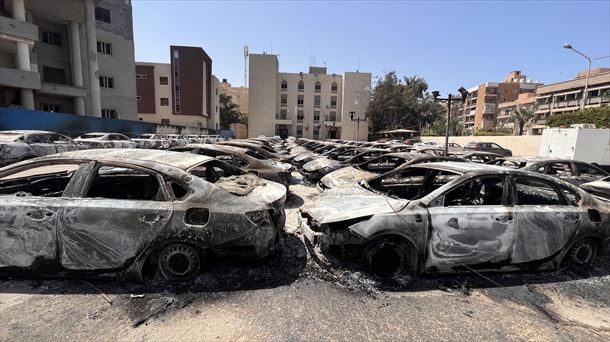Amnesty International has collected the most striking cases of recent years in a report. They shed light on the disappearance of 43 students from Ayotzinapa (Mexico) or what is happening in Libya. He asks Spain to tighten the bill on the victims of the Civil War and Francoism.
The following Tuesday August 30 commemorates the International Day of the Victims of Enforced Disappearancea crime against humanity which consists in the unlawful and unrestricted deprivation of liberty of individuals by government officials or acting with the approval of the authoritiesusually linked to the torture and to extrajudicial execution, with the added suffering of those close to the victims, who will probably never know where their loved ones are. It is a crime under international law.
Countries from all corners of the world have been accused of these practices by human rights groups, who claim the seriousness of these crimes and denounce the impunity of their aggressors, who rarely come to justice.
In Euskal Herria, last year the social forum Permanently claimed”truth, justice and recognition“For these victims on the occasion of the International Day. “This strategy, which incites terror in the citizenry, has been used at least 14 times”, he denounced and “seven victims are still missing”.
A year earlier, in February 2020, the family of ‘naparra‘ was received by the UN Forced Disappearance Group in Geneva, to reopen the case. Exactly in 2013, the UN Committee on Enforced Disappearances published the result of the investigation into Spain’s compliance with the International Convention on Enforced Disappearances, in which it urged the government to search for the disappeared of the Franco regime.
Report of the most notable cases in the world in recent years
This year, in commemoration of this day, Amnesty has collected in a report the most notable cases in recent yearsstarting with one that has once again acquired a special relevance in recent weeks: the disappearance of 43 students from Ayotzinapa (Mexico) in 2014, finally considered a “state crime“which led to the arrest of dozens of peopleincluding former Attorney General Jesus Murillo Karam for “the crimes of enforced disappearance, torture and against the administration of justice”.
In addition to Mexico, Latin America highlights the cases of the disappearance and death of Facundo Astudillo Castro in Argentinawhose body was found 107 days after his disappearance was reported at the end of April 2020 and the 775 cases of enforced disappearance collected from the Working Group on Enforced Disappearances of Colombia.
There are 12,984 missing women in Peru and in Honduras, the whereabouts of four members of the Garífuna indigenous community belonging to the Honduran Black Fraternal Organization (OFRANEH), which was the subject of enforced disappearance in July 2020, also remain unknown.
In Europeemphasizes the conflict of the Balkans, which continues to leave unhealed wounds. More than 1,600 people are still missing since the conflict between Serbia and Kosovo between 1998 and 1999. Concerning: Spainreminds the NGO that experts from the United Nations have recommended that the government and Congress strengthen some aspects of a bill introduced last year to guarantee the right to truth, justice and reparation for the victims of the civil war and the Franco regime .
For its part, the report accuses the authorities of Ukraine of the disappearances of dozens of people in Donbas, from 2014 to 2016.
Demonstration calling for justice for the students of Ayotzinapa (Mexico). Photo: EFE
In AsiaAmnesty International marks the recent anniversary of the Taliban’s conquest of Afghanistan to recall that, over the past 12 months, the fundamentalist movement has committed itself to purging former deposed government officials, ideological rivals or political dissidents, as, for example, in the case of the director of the Herat Women’s Prison, Alia Azizi, whose residence since October of 2021.
Amnesty also denounces the disappearances of members of the Uyghur minority in the “re-education camps” of China or the case of the president IranianEbrahim Raisi, who came to power without being investigated for crimes against humanity in connection with the disappearance of thousands of political dissidents in 1988, when he was head of the judiciary.
The NGO does not forget cases like the disappeared in Burma after the coup in February last year, or the disappearances both carried out by the government Yemeni and the Houthi insurgency during the long and catastrophic war that has ravaged the country since 2015.
In the African continent highlights Libya, one of the epicenters of the global migration crisis. “Both state and non-state actors continue to commit numerous human rights violations against refugees and migrants,” the NGO said. In 2021, Libyan ships intercepted and returned 32,425 refugees and migrants, “many of whom were forced to disappear after disembarkation.”
stand out too Burundiwhere over 250 cases are open to the UN Working Group on Enforced or Involuntary Disappearances and the hundreds of cases of Eritrea. In Kenyaduring the year 2021, the police forced 33 people to disappear. Mozambique, Egypt, Niger, Uganda or Nigeria are part of Amnesty’s African list, which nevertheless covers the positive case of Sudanwhose government has recently ratified the International Convention for the Protection of All Persons from Enforced Disappearance.

Libya is one of the countries mentioned in the Amnesty International report. Photo: EFE
The NGO also dedicates the corresponding sections to: United States and Russia. Amnesty recalls from US authorities that so far no one has been brought to justice for the system of secret detention centers run by the CIA during the “war on terror”.
As for Russia, Amnesty denounces new reports of enforced disappearances, especially in Chechnya, where the fate and whereabouts of Salman Tepsurkayev, moderator of the Telegram channel 1ADAT and critical of the authorities, remain unknown.
(function(d, s, id) {
var js, fjs = d.getElementsByTagName(s)[0];
if (d.getElementById(id)) return;
js = d.createElement(s); js.id = id;
js.src = “//connect.facebook.net/es_ES/sdk.js#xfbml=1&version=v2.8”;
fjs.parentNode.insertBefore(js, fjs);
}(document, ‘script’, ‘facebook-jssdk’));
Source: EITB
I’m Wayne Wickman, a professional journalist and author for Today Times Live. My specialty is covering global news and current events, offering readers a unique perspective on the world’s most pressing issues. I’m passionate about storytelling and helping people stay informed on the goings-on of our planet.



